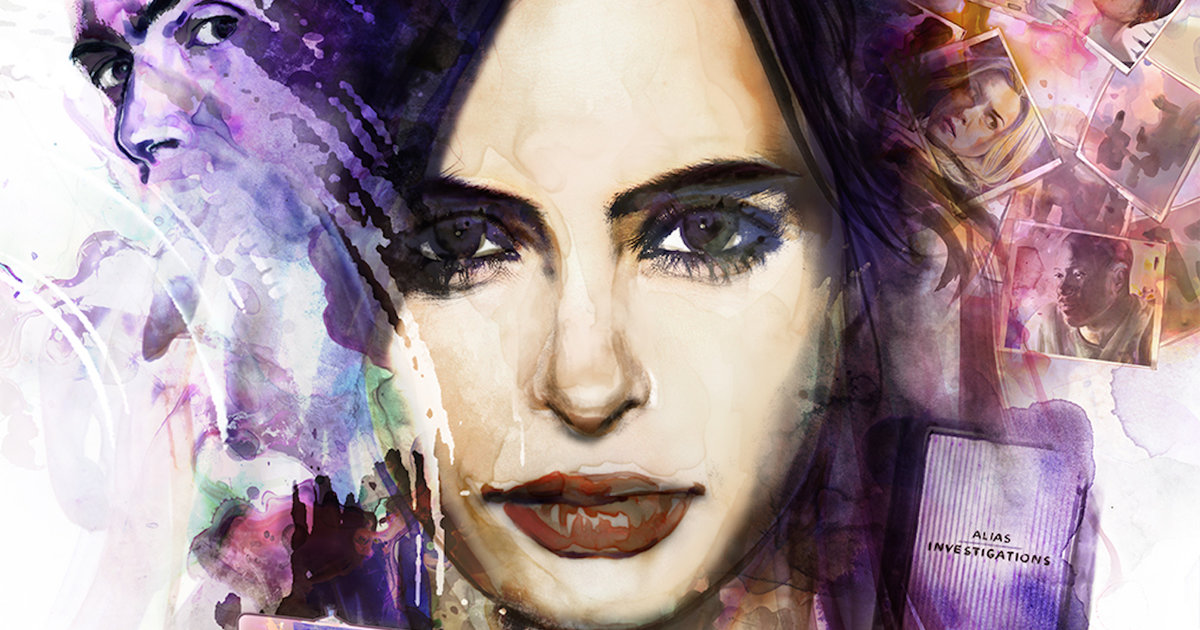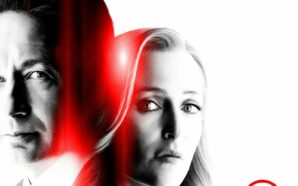In the build-up to the second season of Jessica Jones dropping on Netflix on March 8th, I’ve been rewatching the first. Partly because I remember liking the season but mainly because I remember little else about it. Bingeing a show, and my version of bingeing is watching 13 episodes over a couple of weeks, without stretches of time for me to think about the episode I just watched before watching the next, makes it difficult for me to remember specific details. I liked the show the first time I saw it but this second time, after viewing all of the Marvel/Netflix shows since, I’d say Jessica Jones’ first season is my favourite of the bunch with Daredevil’s first season not far behind. Let me explain why and if, like me, you have forgotten plot points and character beats from the first season then this is the perfect refresher course to get you ready for season 2.
Jessica Jones. Superpowered. Private investigator. Alcoholic. Hero? My favourite thing about Jessica as a protagonist, alongside her sardonic wit and intelligence, is that she’s unique in the fact she doesn’t fight crime. She’s not like the other New York superheroes in that she goes out to take down criminals and be a hero. When she did try and be a hero a couple of years earlier, after being persuaded to by friend and adoptive sister Trish, it turns out to be the start of all her troubles. She uses her super strength to take on some generic criminals and garners the attention of Kilgrave, a British purple-loving mind-controller, who uses his powers to keep Jessica under his spell as both a bodyguard and a lover. The show picks up as a damaged Jessica, now free of Kilgrave, has to confront her nemesis when he returns professing his love for her.
Jessica has to confront her past and discover who she really is when Kilgrave returns to seemingly torment her in the first episode. It’s a great opener which is directed by SJ Clarkson who I briefly saw (spied from my office window) when she filmed the current BBC drama series Collateral at the building where I work which is often used as a filming location because it used to be a prison and still looks like one, barred windows and all. Clarkson introduces the series’ cold blue visual style which (A) looks great and (B) represents Kilgrave’s shadow over both Jessica and the entire show. The opening episode is a noir-inspired slow burn with Jessica following a selection of people she has been hired to get dirt on. It’s character focused and the reveal of her powers is done very well; a superhuman jump here, a lifting up of a car there. Soon she gets hired by some worried parents to find their daughter, a teenager named Hope, who she soon finds and discovers is Kilgrave’s new slave. Hope is delivered to her parents but before they can get away, time and distance offers the only solace from Kilgrave’s control, Hope brutally murders her parents on Kilgrave’s orders. This is his twisted introduction of a game purposed to lead Jessica back to him and be his lover once again, this time willingly with Hope’s fate (life in prison) being used as a bargaining chip.
Unlike Fisk who was a dual protagonist in Daredevil season 1, Kilgrave in just as much bathed in mystery as he is purple light for the first few episodes of the season. He’s a rare psychological villain, his shadow always there, his presence always felt and yet he is only seen in unsettling flashes of Jessica’s memories and visions up until the ending of episode 3 when we get our first good look at him at the same time Jessica does. The third episode also reveals his photo room. This is the first time we get a sense of just how obsessed he is with Jessica as he covers an entire room with photos of Jessica that he has Malcolm, Jessica’s drug-addicted neighbour, take while under his control. It’s a scary concept that anyone in the city could be working for him, anyone an extension of him, achieving his twisted goals. In truth I had completely forgotten that Kilgrave was using Malcolm from the beginning and that he had gotten him hooked on drugs which shows yet another way Kilgrave can control people; Malcolm reveals that he did indeed have control over his actions but kept going back to Kilgrave because of the drugs. Jessica then helps Malcolm to kick the habit and he becomes one of her close friends for the remainder of the season.
It’s not just Malcolm who becomes an ally of Jessica though. Her frequent employer Jeri Hogarth is great here but her messy divorce to Robin Weigert’s character Wendy and affair with secretary Pam feels superfluous for the most part. I feel the character lost her bite in her brief appearances in Iron Fist and The Defenders but she’s very strong in this show. Jessica’s neighbours Robyn and Ruben also have recurring roles and my opinion of them changes with every scene. They represent the innocents caught up in Kilgrave’s game (Ruben is made to slit his throat in Jessica’s bed at the season’s mid-point) but their humour and weirdness often undercuts the seriousness.
Luke Cage is introduced in Jessica Jones before getting his own show and I’m torn on whether he really needed to show up here. Jessica killed his wife, Reva Connors, while under Kilgrave’s control (he wanted footage of the experiments his parents forced on him as a child) and her guilt leads her to spy on him and ultimately, they start a brief sexual relationship. Their scenes together are good, giving us a view of the consequences of Kilgrave’s actions and allow us to get to know the Jessica beneath her hardened surface but I feel it’s too far removed from the main storyline a lot of the time. Luke eventually discovers Jessica is complicit in his wife’s death and after an emotional confrontation he backs off and doesn’t return until the final few episodes which I’ll cover in my next article.
Jessica’s best friend and adoptive sister, Trish Walker, is the perfect comparison for Jessica throughout the season. Trish is a former child star best known as “Patsy” and was abused by her despicable mother before turning to drugs in her teenage years. Unlike Jessica however she has managed to get over the abuse and seemingly has a perfect life as a beloved and popular talk show host but she’s only done so by channelling her anger and pain into other avenues. She’s not quite the superhero she is in the comics but she tries to help people, trains in Krav Maga and has turned her apartment into a fortress. Early on in the season she calls out Kilgrave on the air but when he targets her in return she has to appease him on her show to protect herself. This shows just how loathsome Kilgrave is without him actively being there. He uses his power to intimidate and threaten women and stop them speaking out against him which is very relevant to the landscape we currently live in.
The consequences and aftereffects of superpowers is an interesting topic that certain properties have tried to explore in recent years. In Civil War, The Avengers have to deal with their bombastic tactics and be policed and in Batman V Superman, Superman is blamed for the damage to Metropolis but in Jessica Jones it’s the psychological effects that are explored. Kilgrave is nothing short of a rapist who used Jessica as his personal slave for months and this has affected Jessica in a realistic and fascinating way that you could only ever do on one of these darker, more adult Netflix shows. Also, the idea of superpowers being brought up in court is fascinating with Jessica using her part-time boss, lawyer Jeri Hogarth, to begrudgingly represent Hope in court and try and persuade people she was under mind control when she killed her parents. The distancing of the more fantastical elements of the MCU, which I think was the right decision overall, does hinder the full exploration of superpowered people in the legal system and while the show maintains a dark tone there is fun to be had with this concept. Kilgrave soon becomes the most popular alibi in the city with drug users blaming him for the robberies they commit and a teenage girl insists to her mother that she is still a virgin while being pregnant by using Kilgrave as her excuse. Soon however genuine Kilgrave victims come forward and form a support group with the character of Malcolm at the centre.
At the middle of the season Jessica is at her lowest point. The game Kilgrave is playing has cost multiple lives such as her neighbour Ruben, she almost killed Wendy while in a drunken state when she refused to sign Hogarth’s divorce papers and her attempt to capture Kilgrave failed when it was revealed he has several guards following him at all times. She decides to go to the police and tries to get sent to a maximum-security prison to capture Kilgrave on cameras when he comes for her and so she spends episode 7 saying her goodbyes. It’s a fantastic sequence as she bids farewell to Trish, demands that Trish’s mother doesn’t go near her daughter while she is away and climbs to the top of a bridge to say goodbye to the dark, seedy city that she calls home. However, when she arrives at the police station Kilgrave is there and threatens the lives of every officer if she doesn’t come with him. He doesn’t want to use his powers on her ever again and has bought Jessica’s childhood home as a gift and to save the cops, and try and capture Kilgrave’s confession on tape, she leaves with him.
Next week I’ll be continuing my revisit of season one of Jessica Jones, focusing more on the villains and the faster-paced final episodes, but to round out the article here are a few more sporadic thoughts on the show:
- It’s very strange with the adult themes and the graphic violence and sex that there is no strong language in the show. There is one muttered F-bomb but I needed subtitles on to pick up on it and I feel like Jessica is a character who would naturally swear quite a lot.
- Despite refusing to do so in his own show, Luke Cage swears occasionally in this show but yellow is already cemented as his colour and Pop is mentioned so 2 out of 3 isn’t bad.
- I’m not a fan of the MCU connections in this show. I think you should either go all-in or don’t mention it at all. Jessica Jones goes half measures and makes odd references without using names. “The big green dude and his crew” and “the flag waver”. There’s a kid dressed as Captain America at one point too. I do like the couple early on in the series who blame Jessica for the events of The Avengers though and they mention that the city was attacked by aliens.
- The first episode is similar to Daredevil’s first episode with Hope being framed for murder just like Karen Page is in that show.
- Jessica and Luke having sex straight after finding out the other had superpowers and could now use their full strength was great.
- Jessica Jones has my favourite opening credits of any of the Marvel shows and the theme is amazing. The music is fantastic in general; very noir inspired.
- Jessica was my favourite part of The Defenders, a show I found quite middling, and I’m glad I get to return to that character without the large flaws of that team-up series.
What do you make of the debut season of Jessica Jones? What is your favourite Marvel/Netflix show? Let me know in the comments and geek out with me about TV, movies and videogames on Twitter @kylebrrtt.








